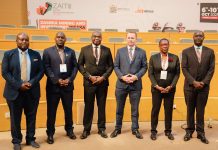President-elect Hakainde Hichilema’s landslide victory in the country’s national elections on 12 August has produced a palpable sense of relief within Zambia and on the global stage, stemming from fears that another term for the Patriotic Front would have moved the country ever closer towards authoritarian rule and economic ruin. Fostering “a better democracy” was, in fact, among the first things that Mr Hichilema promised in his debut address to the nation on Monday, and which he also reiterated in the abridged version of the speech published on his personal Facebook page, one of the social media platforms on which he communicated his party’s plans and principles in the run-up to the election, helping him to garner a substantial portion of the youth vote.
Mr Hichilema will more than likely make detailed pronouncements in his inauguration speech, due to be delivered on 24 August. But, beyond pledging to implement “stable” and “predictable” policies, what can we reasonably expect to see from his administration?
Dealing with the debt
Tackling Zambia’s debt crisis is perhaps the most pressing task on the Cabinet’s immediate agenda. Zambia’s estimated external debt of $12 billion is a major issue holding back the economy. To this end, Mr Hichilema made the country’s economic woes a focus of his campaign, saying: “At the core of my politics is a belief that Zambia has the potential to become a successful middle-income country.” When asked in a June 2021 interview what concrete measures he intends to take – if elected – to deal with the debt crisis, he pointed to “crippling” levels of external and domestic debt saying: “We want to focus on restructuring the debt. That starts with us putting a moratorium on borrowing. Secondly, we will stop access to credit facilities for consumption. Revenues will be focused on investment expenditure and productive sectors that will be more inclined to create jobs.”
This is echoed in the UPND’s Party Manifesto 2021-2026, which states, “In 2021, we will firmly implement credible policies to lower the fiscal deficit, restore market confidence, bring stability to the economy, enable a speedy recovery in economic growth, and ensure debt management and sustainability.”
The party commits in its manifesto to creating a regulatory environment that addresses “critical impediments” to implementing a successful economic transformation agenda, with a significant three out of five of the related steps referring to tackling Zambia’s serious fiscal situation.
This all suggests that Mr Hichilelma has no illusions about the task he is up against, and that we can expect some swift and decisive reforms to the management of the nation’s finances by his Government in the near-term.
Attracting investment
On 19 August, Mr Hichilema again utilised social media to remind Zambians that attracting investment is one of his administration’s top priorities. “We intend to continue inspiring confidence for investors, the online post stated. “We are glad that the markets are reacting positively following our election.” Indeed, ahead of the polls, Kevin Daly of Aberdeen Standard Investments, part of the Zambia External Bondholder Committee, predicted that a win for Hichilema would see a rally in Zambian assets.
Ensuring that Zambia is competitive globally and provides investors with the right incentives is key to attracting investment in every sector, including the country’s major foreign exchange earner: mining. The fact that Mr Hichilema is a financially successful businessperson is encouraging, and is believed to have won him substantial investor support as the election’s pro-business candidate.
The UPND called private sector development, “the engine of innovation, employment creation, investment and growth for any economy” and, along with outlining measures to support new businesses, the manifesto also highlights the importance of “creating the right conditions for businesses to expand and grow…if we are serious about achieving the Vision 2030.”
Under Lungu’s administration, the business and policy environment was not at all conducive for Zambia’s major revenue earner, the mining sector, to expand and grow. This looks set to change under Mr Hichilema, who has been quoted saying: “We need investment, which will require an attractive and consistent environment…”
Mr Hichilema has said: “We need investment, which will require an attractive and consistent environment.”
Leveraging mining
Analysts and respected media houses alike have expressed optimism regarding the reforms to this industry that they expect Mr Hichilema to introduce, with S&P Global Platts calling the president-elect “a boon for mining sector reform”. The UPND leader has also been vocal in acknowledging that mining is a strategic sector with the potential to play a big role in reviving Zambia’s economy. However, the party’s manifesto is a bit thin on detail, in this regard.
It has pledged “major mining sector policy reform,” including tax policy and administration reform – which sounds promising but depends of course on the particular reforms that are made. But perhaps the most important aspect of this pronouncement is the commitment to “bring[ing] various stakeholders on board to design a sound policy and administration system.” Genuine cooperation between Government and mining companies in determining the policies through which the sector is to perform and grow was desperately lacking in the Lungu era.
Godwin Beene, President of the Chamber of Mines said last week: “The president-elect has reset the tone to one of rebuilding confidence and spurring growth. The industry is very positive that with this common-goal approach to the way forward, there will be more of a partnership with Government than we have ever seen before.”
In particular, the sector hopes that these reforms will allow mining companies to deduct mineral royalties from the tax they pay on profits, a reform which economist Oliver Saasa and several other finance and tax experts have frequently urged Government to implement. The sector has also requested a review of the Mineral Royalty Tax structure, to a sliding-scale system that is levied on a pay-as-you-earn basis.
These two key measures would restore confidence among investors, ‘pressing go’ on stalled expansion projects – including First Quantum Minerals and Lubambe’s respective $1 billion projects which have been on hold while awaiting these particular reforms.
Along with Mr Hichilema’s promise of collaboration with mining houses and moves to improve stakeholder participation, he also mentions the importance of policy stability, the lack of which (via frequent and erratic changes to the mining fiscal regime) has been blamed for holding back the sector’s growth.
Without policy predictability, investors cannot plan for the future or feel confident that they will see an adequate return on the capital that they take the risk of investing. Stable – and, crucially, also good – mining policies hold the key to making Zambia competitive with other resource rich countries.
With the price of copper increasing – a trajectory which is expected to continue, based on the green energy sector’s copper demands – Zambia needs to expand production without delay in order to cash in on this good price. As Professor Saasa put it in his recommendations to the new Government in the first 100 days, “Without investment, we cannot expand – or even maintain – the level of production, and if we don’t do this at the same time as cashing in, we’ll discover that in the medium to long term, we will have lost out.”
Developing ‘local content’
Another of Mr Hichilema’s plans, according to the UPND’s manifesto, is to put in place a national supplier development policy for the mining industry, in order to increase the local supply of goods and services to the industry. In principle, the need to develop local input to the supply chain is undisputed in the industry, and several mining companies in Zambia already have well-advanced supplier development programmes, and a whole host of other local economic development initiatives along these lines.
According to Veston Malango, CEO of Namibia’s Chamber of Mines, Government is unlikely to be fully aware of the breadth and impact – or even the existence – of such programmes. According to Mr Malango, the approach of Government should always first be to study what already exists, to reinforce current successes and encourage the widespread adoption of identified industry best practices. In his experience in Namibia, some companies’ targets are more progressive than Government’s imagining and – with a much deeper hands-on understanding of the mining supply chain – many company supplier development initiatives are far more effective in developing sustainable local businesses. In February 2021 a draft Statutory Instrument (known as the ‘Local Content Regulations’) was produced without seeking any input from the private sector; it is widely regarded within the industry to be completely unworkable. As Professor Saasa recently explained: “Sector specificity is important, and legislation should not be straight jacketed.” The new Government and the mining sector have in this a great opportunity to show what genuine collaboration can deliver, to the benefit of the country.
In discerning a likely course for the coming weeks and months of Mr Hichilema’s administration, one particular statement in the Party’s manifesto seems to echo the mining sector’s own ambitions for setting Zambia back on a growth path. It reads: “The UPND Government is up to the task of instituting a robust recovery programme and placing the economy back on its previous growth path.” If this statement sets the tone for the actions that are soon to come, Zambia has good reason to instil its confidence in the new Government. As the Chamber of Mines has pointed out on many an occasion: “Only through growth can we deliver more.”
(Image via the UPND’s Party Manifesto 2021-2026)
See also: Democracy does it again























